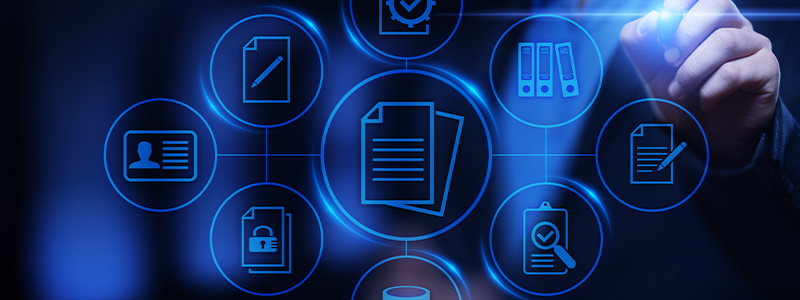
The Defense Can Rest While AI Handles The Legal Documents
What’s one thing all your favorite legal shows have in common? Whether it’s Suits or The Lincoln Lawyer, they rarely show the amount of paperwork lawyers have to handle on a daily basis. Understandably so, paperwork isn’t the most glamorous part of the job but that doesn’t mean it’s not crucial.
In fact, lawyers deal with tens, if not hundreds, of documents on a daily basis during most parts of their job, such as discovery, research, or drafting. But what if, just like Harvey Specter, every lawyer could have their very own Mike Ross? Someone who memorizes all the legal documents they read and can offer relevant insights when prompted.
That’s what AI is capable of being for lawyers; a reliable (junior) partner who can handle the grunt work and extract relevant insights in record times. AI adoption is on the rise in the world of law. The Wolters Kluwer Future Ready Lawyer Report 2023 revealed that 73% of lawyers planned on utilizing AI in their legal work.
Plus, a survey shows that a majority of legal professionals think effective AI use will be the difference between successful and unsuccessful law firms in the next five years. So how exactly can AI help your law firm be successful? Let’s find out!
Partner up with Astera to take your firm to new heights
Astera's no-code solution streamlines your document processing efforts. Using our AI, you can process your documents faster, more accurately, and effortlessly.
Let's discuss your document processing.How AI helps law firms turn legalese into ease
AI has the potential to help law firms on multiple fronts. A survey of lawyers revealed that research (65%) and document drafting (56%) are the two areas where they think AI has the most potential.
Take the work out of paperwork
Burying the opposition in paperwork is portrayed as a common tactic in legal shows, but what if AI could process all your documents and help you get ahead of the paperwork? AI-powered document processing solutions do just that!
Instead of spending days poring over court filings, affidavits, contracts, and legal briefs to manually extract relevant information, you can now get AI to do all the work for you in seconds instead of hours. All you have to do is specify the fields you need and the AI handles the rest.
Process any document, from any source, in any format
Some of the biggest challenges of automating document processing in the past have been:
- Your documents are unstructured (i.e., most legal documents follow different formats and templates),
- They come from disparate sources (such as client records, discovery, court filings, etc.), and
- They exist in different file types (such as PDF, DOC/DOCX, RTF, CSV, JSON, etc.)
The typical workaround for these challenges has been that users define the templates that their documents follow, which are then used to extract data. Moreover, the different sources need to be mapped manually while documents may also need to be converted to the supported formats. This means slower document processing with lengthy turnaround times.
However, AI-powered solutions take all the work out of document processing using features like automated data extraction and intelligent data mapping to make document processing a breeze.
Make that paper work!
Yes, an AI-powered document processing platform can help your law firm process thousands of documents in a few clicks. But the real fun of having AI in your corner begins when you can talk to your data to generate insights. That’s where LLMs come in. In the simplest of terms, you can leverage the natural language capabilities of an LLM (like ChatGPT or Gemini) to interact with your private database.
The best part? You don’t have to worry about sending your data outside your organization. All your confidential data remains confidential while you leverage AI to generate insights that take your law firm to the next level.
The even better part? You can extract these insights using simple prompts in the English language. That’s right. No complex SQL or coding knowledge is required.
Why AI and Your Legal Docs Should Partner Up
According to a Statista study, most lawyers are open to incorporating GenAI into their workflow, provided they understand how it works and if the AI tool has precise training. Another interesting insight from Statista is that law firms think GenAI would have the strongest impact on document drafting, while they want AI to have the strongest impact on analysis and preparing summaries.
Lawyers today are expected to make well-informed decisions, craft strong strategies, and have a big-picture perspective. To achieve all this in a shorter time span, they can leverage AI to cut their research time and simplify their document processing. Of course, the possibilities of leveraging AI in the legal sector are many, but here are some practical examples of how AI helps you make the most of your legal docs:
- Easily identify and extract relevant information: GenAI saves legal professionals the hassle of sifting through volumes of case law and aggregating and summarizing the data. Since AI can do the sifting much faster, lawyers can leverage it quickly and effortlessly identify and extract the information they need.
- The power of analytics in your palm: Litigation analytics can be a powerful tool for lawyers, but this requires cleansing and prepping data first. AI-powered document processing automates the grunt work. This allows lawyers to transform their unstructured docs into structured data that has been cleaned, prepped, and validated in just a few clicks. Lawyers can then easily visualize trends and garner insights to augment their strategies.
- Focus on what truly matters: By automating their document processing, lawyers can leave the mundane tasks to AI while focusing on legal work that requires their analytical skills, nuanced understanding of the law, client relations, leadership skills, and deep thinking.
Your Honor, We Rest Our Case
It’s true that AI is being used as a buzzword these days, but when it comes to legal documents, AI can have a lasting impact on how lawyers and firms deliver value to their clients.
The legal profession has the unique advantage of viewing AI as a technology that can streamline their work (instead of as an existential threat). So, legal firms that move first to integrate AI in their workflow stand to gain significantly. These gains include increased productivity, saving hundreds of hours, and the ability to take on more clients with the same level of resources.
At Astera, we’re incorporating AI into our award-winning solution to help law firms do more with less. Our AI-powered, no-code solution is designed to help your lawyers make easy work of their legal documents.
Astera Intelligence empowers lawyers to make the most of their legal docs without spending hours sifting through them. This makes research, document drafting, discovery, and all the other document-intensive legal activities faster and easier than ever.
Need the evidence? Just contact us for a no-charge customized demo today.
 Astera AI Agent Builder - First Look Coming Soon!
Astera AI Agent Builder - First Look Coming Soon!

